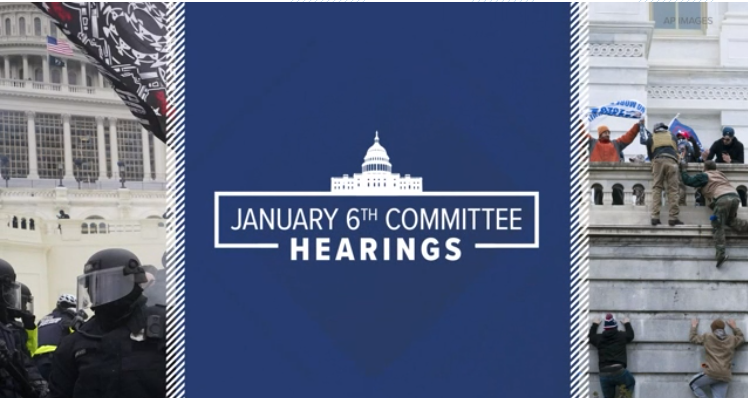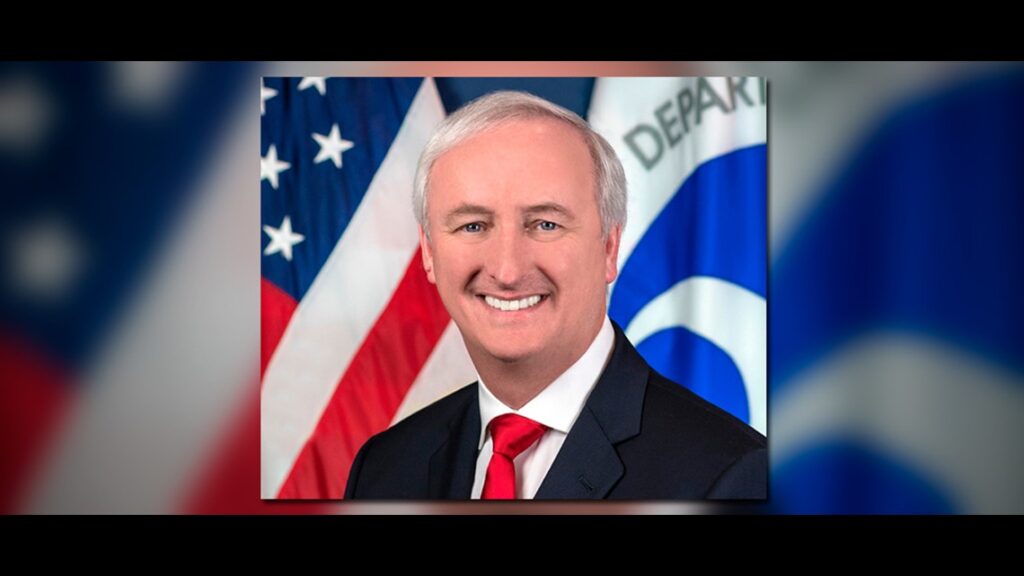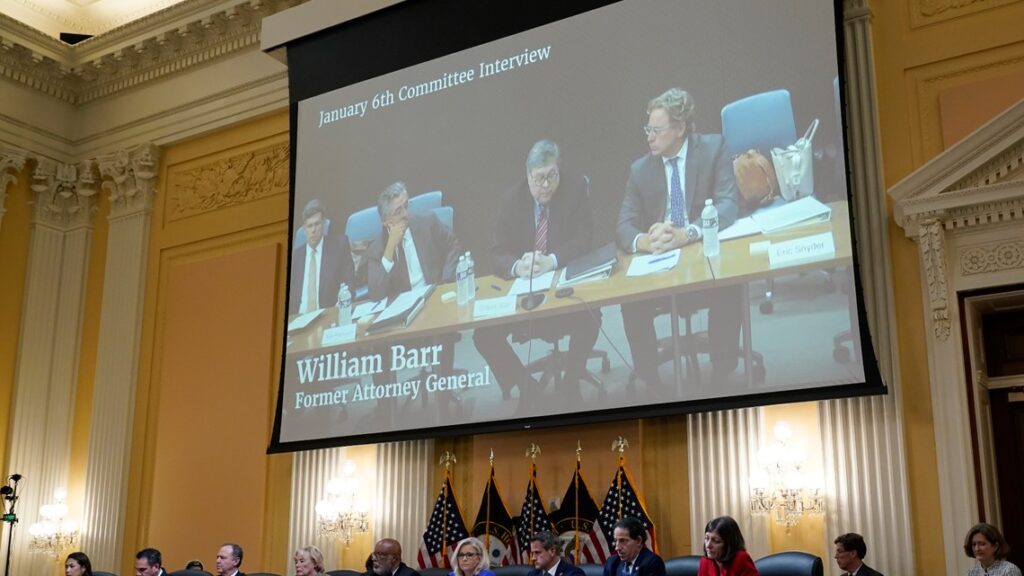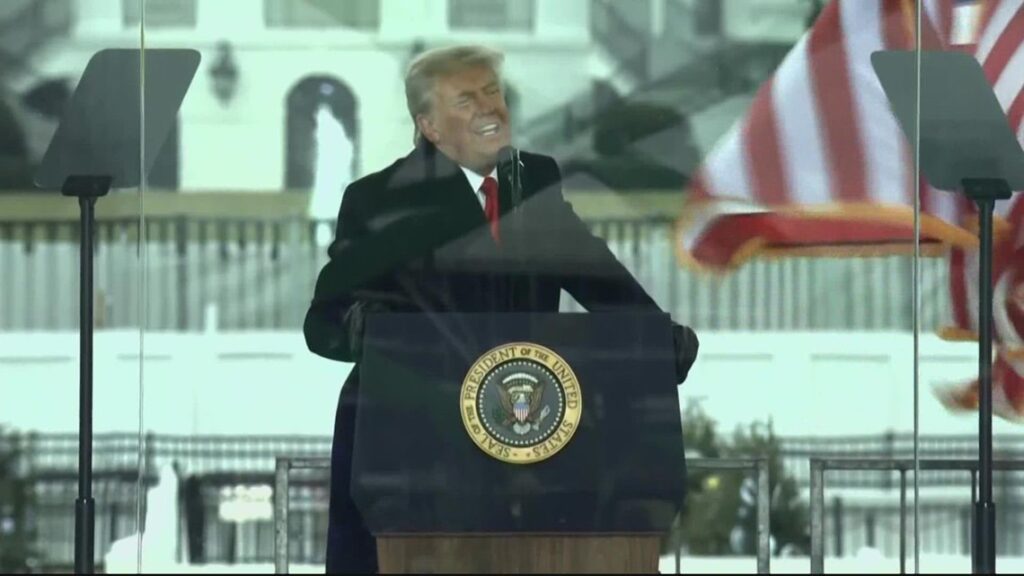
House committee investigating Jan. 6 Capitol riot postpones Wednesday’s hearing
Witnesses at Wednesday’s hearing were to include Jeffrey Rosen, who was the acting attorney general at the time of the Capitol insurrection.
By: Victoria Dugger, Jordan Fischer, Laura Wainman, Associated Press
WASHINGTON — The next set of details from the House Select Committee to Investigate the January 6th Attack on the United States Capitol is being delayed, the committee said Tuesday.
An email sent out by the committee said Wednesday’s planned morning hearing would be postponed and the Select Committee’s next hearing will take place Thursday, June 16 at 1 p.m.
Wednesday’s hearing was set to take place at 10 a.m. Eastern. No reason was immediately given for the postponement. More details were expected to be released.
A spokesman for the panel attributed the postponement to “a number of scheduling factors, including production timeline and availability of members and witnesses.”
Rep. Adam Kinzinger, a Republican member of the committee, said on Twitter that the hearing had been moved to next week as a way to “space out” the testimony surrounding the insurrection, when crowds of Trump supporters stormed the Capitol and interrupted the certification of President Joe Biden’s victory.
The committee has already held two hearings, including a primetime one last week that featured never-before-seen video of extremists leading the deadly siege. Another hearing is set to take place on Thursday.
The witnesses at Wednesday’s hearing were to include Jeffrey Rosen, who was the acting attorney general at the time of the Capitol insurrection, as well as two other former top officials at the Justice Department, Richard Donoghue and Steven Engel. Lawyers for all three men did not immediately return messages seeking comment.

In this image provided by the Department of Transportation, deputy transportation secretary Jeffrey Rosen is shown in his official portrait in Washington. (Department of Transportation via AP)
The witnesses, all of whom have since left the Justice Department, are expected to testify about how Trump sought to bend the department to his political will during the final days of his administration by urging officials to declare the election as corrupt and to aid in his efforts to challenge the results of the race won by Democrat Joe Biden.
Though the lawyers’ accounts have been documented by the news media, the hearing will give the American public its most detailed glimpse of a near-revolt inside the Justice Department as Trump contemplated replacing the agency’s top official with a lower-level lawyer seen as more willing to advance the president’s false claims that the election was stolen. Several other senior officials warned Trump in a White House meeting that they’d resign if the leadership change occurred.
Rosen took over the department following the December 2020 departure of William Barr, who angered Trump by saying the department had not found fraud that could have affected the results of the election. Trump quickly soured on Rosen, too, after the then-acting attorney general rejected entreaties from the president and the White House to challenge the election results.

A video showing former Attorney General William Barr speaking during an interview with the Jan. 6th Committee is shown as committee members from left to right, Rep. Stephanie Murphy, D-Fla., Rep. Pete Aguilar, D-Calif., Rep. Adam Schiff, D-Calif., Rep. Zoe Lofgren, D-Calif., Chairman Bennie Thompson, D-Miss., Vice Chair Liz Cheney, R-Wyo., Rep. Adam Kinzinger, R-Ill., Rep. Jamie Raskin, D-Md., and Rep. Elaine Luria, D-Va., look on, as the House select committee investigating the Jan. 6 attack on the U.S. Capitol holds its first public hearing to reveal the findings of a year-long investigation, at the Capitol in Washington, Thursday, June 9, 2022. (AP Photo/J. Scott Applewhite)
Around that time, the president was introduced by Rep. Scott Perry, a Pennsylvania Republican and ardent Trump backer, to Jeffrey Clark, a little-known assistant attorney general who postured himself as willing to advance Trump’s baseless voting fraud claims.
At one point, according to testimony provided to lawmakers, Clark presented colleagues with a draft letter pushing Georgia officials to convene a special legislative session on the election results. Clark wanted the letter sent, but superiors at the Justice Department refused.
A lawyer for Clark did not immediately return a phone message on Wednesday.
Clark’s support led Trump to openly contemplate naming him as acting attorney general in place of Rosen.
The situation came to a head during a tense, hours-long Jan. 3, 2021 meeting at the White House in which Engel and Donoghue told Trump that they would resign from the Justice Department if Trump proceeded with his plan to fire Rosen and replace him with Clark.
Trump ultimately relented, and Rosen remained on as acting attorney general through the end of the administration.

WHEN IS THE NEXT HEARING?
There could be up to eight hearings through the month of June, including at least one more prime-time hearing. The known hearing dates (all times Eastern):
- Friday, June 10 at 8 p.m.
- Monday, June 13 at 10 a.m.
- POSTPONED: Wednesday, June 15 at 10 a.m.
- Thursday, June 16 at 1 p.m.
- Tuesday, June 21 at 1 p.m.
- Thursday, June 23 at 1 p.m.
WHO IS ON THE COMMITTEE?
- Bennie Thompson (D-Mississippi), Chairman
- Liz Cheney (Wyoming-R), Vice Chairwoman
- Zoe Lofgren, (D-California)
- Adam Schiff, (D-California)
- Pete Aguilar, (D-California)
- Stephanie Murphy, (D-Florida)
- Jamie Raskin, (D-Maryland)
- Elaine Luria, (D-Virginia)
- Adam Kinzinger (R-Illinois)
WHAT TO EXPECT?
“If the committee delivers on what Liz Cheney promised it would, the Justice Department is going to be under enormous pressure to bring charges against former President Trump and possibly others who worked with him to try to thwart the lawful counting of the votes,” George Washington University Law School professor Stephen Saltzburg said Thursday after the first hearing.
On that note, here’s some of what the committee promised:
- Testimony from staffers in the White House on Jan. 6 that Trump told his staff the rioters were, “Doing what they should be doing.” Even more damning, Cheney said, will be testimony that when Trump learned supporters were chanting for Mike Pence to be hanged, he allegedly said, “Maybe they have the right idea.”
- Depositions from close advisers to Trump saying under oath that he knew he lost the election. The committee showed a few of them Thursday night, including one in which then-Attorney General Bill Barr said he told Trump his election fraud claims were “bulls***.” In another deposition, Trump’s eldest daughter and senior adviser, Ivanka, said she believed Barr. In a third, campaign adviser and spokesman Jason Miller said the Trump campaign’s data guy informed the former president in no uncertain terms that he was going to lose the election.
- Evidence showing multiple Republican members of Congress sought pardons from Trump in the days after the riot. According to Cheney, those members include Rep. Scott Perry (R-PA), who is alleged to have participated in the plan to overturn the election — specifically, according to the committee, the goal of replacing then-acting attorney general Jeff Rosen with DOJ lawyer Jeffrey Clark. Cheney said the plan was for Clark to then send a letter to six states, including Georgia, saying the Justice Department had identified concerns that might have impacted the outcome of the election. “That letter is a lie,” Cheney said.
- Testimony from Jeff Rosen himself, who confirmed Friday he would appear publicly before the committee at a hearing Wednesday. Rosen will be joined by former DOJ colleagues Richard Donoghue and Steven Engel. During Thursday night’s hearing, the committee played part of Donoghue’s deposition in which he said he told Jeffrey Clark his plan was “nothing less than the United States Justice Department meddling in the outcome of a presidential election.”
- Greg Jacob, who was general counsel for former Vice President Mike Pence, is also set to testify. Cheney said Jacob will speak during an upcoming hearing about Trump’s “relentless” efforts to rope Pence into his scheme to overturn the election. The public already heard part of a deposition from Pence chief of staff Marc Short, who said the former vice president’s “fidelity to the Constitution” was more important to him than loyalty to Trump.